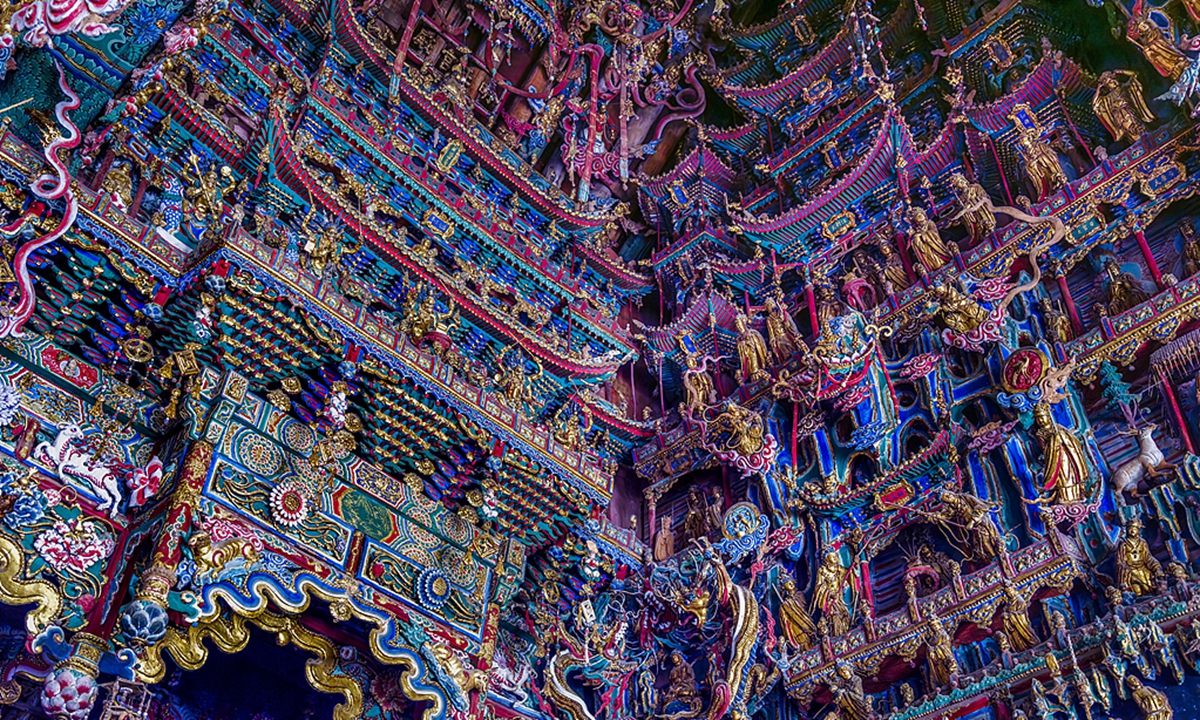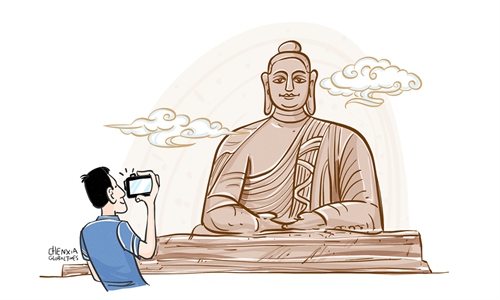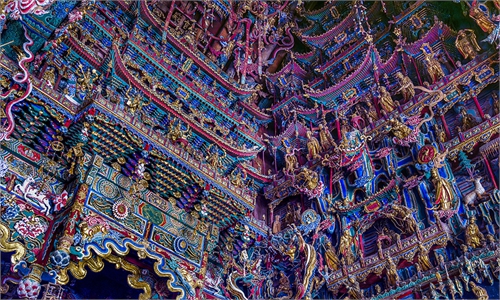ARTS / CULTURE & LEISURE
Coping with 'Wukong Effect': a small county's response to surging tourism

Xiaoxitian Temple in North China's Shanxi Province Photo: VCG
During the National Day holidays, Xixian county in the city of Linfen, North China's Shanxi Province, ended up under the spotlight due to its role in inspiring the art design of popular video game Black Myth: Wukong. The county's Xiaoxitian Temple served as one of the key inspirations for the suspended sculptures of the Buddhist kingdom the player's character, The Destined One, enters in the game.
However, long lines triggered frustration among tourists. Fortunately, the local authority quickly responded by introducing a series of measures to solve the problem. Experts said it is necessary to create a provincial-level information sharing platform to provide tourists with up-to-date information, so they can make informed decisions in advance.
Located atop Fenghuang Mountain, Xiaoxitian is a national key cultural relic protection unit. The scenic area has long attracted flocks of tourists.
The scenic area posted a thank you letter to tourists on Monday, promising that visitors with a ticket purchase voucher for the Mid-Autumn Festival to the National Day holidays can return to visit for free before the end of this year.
The Director of the Xiaoxitian Scenic Area Service Center Liu Xiaogang told the Global Times on Monday that the daily peak number of tourists to the temple reached 17,626. A total of 88,619 tourists were received in the first six days of the National Day holidays.
It is notable that the main hall of Xiaoxitian Temple, the core viewing area with nearly 2,000 Buddha statues, is just 169 square meters in size. Its colorful suspended sculptures are regarded as treasures in the history of Chinese sculpture art.
Right before the Golden Week, the service center established a tourism guarantee headquarters, which developed work and emergency plans for the peak tourism period to deal with volumes of 5,000 people, about 10,000 people, and above 15,000 people.
The service center stretched opening hours to as early as 6:30 am, which helped prevent too high a concentration of visitors. The center also adopted a reservation system so that visitors could book specific time slots, Liu said.
Measures were quickly taken after many tourists gave the visitor experience at the scenic spot bad reviews.
On Wednesday, many tourists were reported to have been shouting "Xiaoxitian, chaping!" or "Bad review for Xiaoxitian." In response to the situation, the Xixian County Bureau of Culture and Tourism circulated a letter to visitors on Thursday morning asking for tolerance.
It noted that, as an agricultural county, the county is stepping up efforts to transform into a tourist location thanks to the trust of tourists.
Three parking lots were arranged, offering free shuttle buses, with parking areas of government departments, enterprises and institutions in the county open for visitors as well during the holidays, the letter mentioned.
The letter also stated that the county has been working hard to re-plan a one-way tour route and setting up a pedestrian area on Fenghuang Street.
In a video clip posted on social media platforms on Monday, Liu Wei, a deputy director of the Xixian Public Security Bureau, can be seen speaking to tourists through a speaker: "Everyone has put forward their opinions, and we will make rectifications immediately. But the safety of the people comes first. No matter how much you complain or scold, your safety must come first!"
Lü Xuehui, a deputy county magistrate of Xixian, could also be seen in the video singing for tourists at the scenic area.
Media reports said that the Party secretary of the Xixian Communist Party of China (CPC) Committee and major government officials of all departments canceled their vacations so they could stand duty on the front lines.
Huang Shenghui, director of the Xixian Public Security Bureau, went to the scenic spot and explained to tourists, "Please give me half an hour and I will solve the problem." He then walked into the crowd to direct tourists, "For everyone's safety, don't crowd each other."
Jiang Yiyi, a deputy dean of the sports, leisure and tourism school at Beijing Sport University, told the Global Times on Monday that local authorities need to implement more measures to manage tourist volume.
"A booking system is needed for local tourism management, so that people will learn about availability before they get to the location and understand what to expect," Jiang said.
Jiang noted that tourists were following the buzz about the location created online, but, by contrast, the county level scenic area has limited capacity to receive visitors.
To deal with this challenge, cultural and tourism departments need to encourage tourists to be more rational in choosing where to go and what to do during the holidays.
"For provincial tourism departments, it is imperative to create a real-time information sharing platform to let the tourists know which scenic areas still have openings for bookings and parking spaces," she stressed.
To avoid long wait lines, it would be helpful to provide tourists information about where else they can visit, dine or rest, Jiang said.


